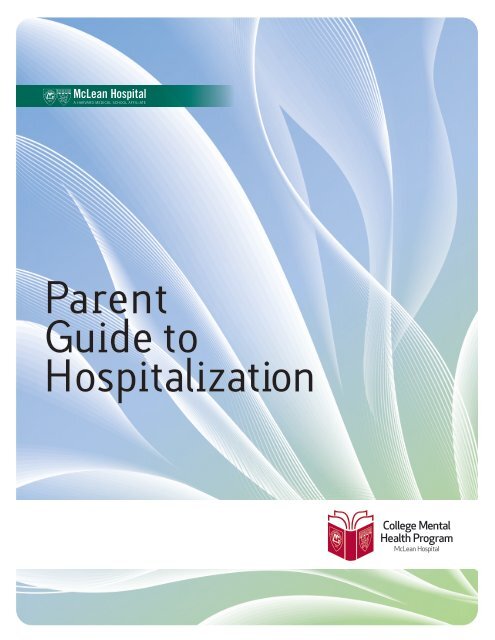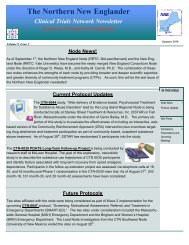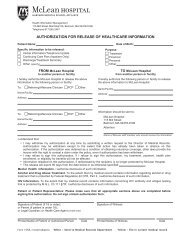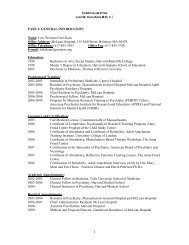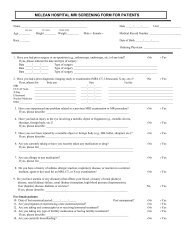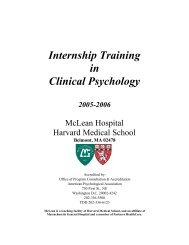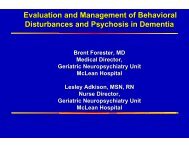Parent Guide to Hospitalization - McLean Hospital
Parent Guide to Hospitalization - McLean Hospital
Parent Guide to Hospitalization - McLean Hospital
Create successful ePaper yourself
Turn your PDF publications into a flip-book with our unique Google optimized e-Paper software.
<strong>Parent</strong><br />
<strong>Guide</strong> <strong>to</strong><br />
<strong><strong>Hospital</strong>ization</strong><br />
College Mental<br />
Health Program<br />
<strong>McLean</strong> <strong>Hospital</strong>
Table of Contents<br />
Overview of College Mental Health Challenges<br />
Facts and Figures about Mental Health<br />
Does my Student Need Help?<br />
How <strong>to</strong> Find Treatment<br />
How <strong>to</strong> Talk With Your Student about Getting Help<br />
When your Student Needs <strong>to</strong> Take a Semester Off<br />
In an Emergency<br />
Levels of Care for You and Your Student <strong>to</strong> Consider in a Psychiatric Crisis<br />
Internet Resources for <strong>Parent</strong>s<br />
What every <strong>Parent</strong>/Guardian Should Know<br />
Confidentiality Rights and Authorization<br />
All about Insurance Coverage<br />
Self-Care for Caregivers<br />
<strong>Parent</strong> FAQ’s About Student <strong><strong>Hospital</strong>ization</strong><br />
Should my college student be hospitalized?<br />
What does this hospitalization mean for my college student and his/her future?<br />
What does the hospitalization mean for my student’s academic future?<br />
How do I explain the interruption in my student’s life?<br />
How often can I see my child if he or she is hospitalized?<br />
What can I expect if my child is going <strong>to</strong> an “inpatient unit”?<br />
What do I say <strong>to</strong> my student?<br />
How do I help myself?<br />
What do I say <strong>to</strong> others?
Overview of College<br />
Mental Health Challenges<br />
College is an exciting time in the lives of young adults. With this new experience<br />
comes the promise of a bright future, new relationships, new beginnings, and new<br />
expectations.<br />
As with any new experience, adjusting <strong>to</strong> life at college is fraught with its own unique<br />
set of challenges. To support their students, most college health centers offer mental<br />
health services. These services are geared <strong>to</strong>ward helping students develop strategies<br />
for navigating the new landscape of life at college.<br />
Still, coping with these challenges can be stressful and overwhelming. Moreover, for<br />
some young adults, the timing of college coincides with changes in the biochemistry of<br />
their own bodies, changes than can have a profound effect on their moods and ability<br />
<strong>to</strong> regulate their emotional health. These physical changes—hormonal or physiologic<br />
—can exacerbate feelings of stress and precipitate a crisis. If left undiagnosed and<br />
untreated, these changes in brain chemistry and emotional health can have serious<br />
consequences.<br />
As parents or guardians, you want <strong>to</strong> do whatever is necessary <strong>to</strong> help your child<br />
be happy and successful. When students have mental health crises, their parents<br />
often feel overwhelmed and unsure about how <strong>to</strong> help. Worse, many parents find<br />
that they do not know how <strong>to</strong> navigate the mental health system. With so many<br />
available treatments, as well as a wide range of medications, parents and students<br />
understandably struggle <strong>to</strong> find care that truly meets their needs.<br />
This booklet will help you <strong>to</strong> find more information about mental health care, learn<br />
how <strong>to</strong> take care of yourself while your student is going through a difficult time, and<br />
find out how other parents have made it through.<br />
Click here for some more facts and figures on mental health.<br />
Back <strong>to</strong> Table of Contents
OVERVIEW<br />
Facts and Figures about Mental Health<br />
Did you know that:<br />
A An estimated 26.2 percent of Americans ages 18 and older—about one in four adults—suffer from a<br />
diagnosable mental disorder each year.<br />
A Major depressive disorder affects approximately 14.8 million American adults or about 6.7 percent of<br />
the U.S. population age 18 and older in a given year.<br />
A Psychiatric illnesses are the leading cause of disability in the U.S. and Canada for ages 15 through 44.<br />
A Many people suffer from more than one mental disorder at a given time.<br />
A Suicide is the second leading cause of death among young adults ages 18 through 25; second only <strong>to</strong><br />
accidents.<br />
A With proper treatment, 90 percent of individuals diagnosed with a psychiatric illness can live<br />
productive lives.<br />
A Treatment usually includes medication, psychotherapy or a combination of the two. For many,<br />
hospitalization is recommended.<br />
4 <strong>Parent</strong> <strong>Guide</strong> <strong>to</strong> <strong><strong>Hospital</strong>ization</strong> Back <strong>to</strong> Table of Contents
Does My Student Need Help?<br />
Signs of depression vary from student <strong>to</strong> student, but generally a<br />
student may need support if he or she is experiencing:<br />
A Persistent feelings of sadness, anxiety or emptiness<br />
A Hopelessness<br />
A Feelings of guilt, worthlessness or helplessness<br />
A Loss of interest in academics, activities, hobbies<br />
A Inability <strong>to</strong> concentrate, focus, or study<br />
A Trouble sleeping, waking up <strong>to</strong>o early, or sleeping <strong>to</strong>o much<br />
A Withdrawal or isolation from family, friends, social community<br />
A Thoughts of death or suicide with or without suicide attempts<br />
How <strong>to</strong> Find Treatment<br />
How <strong>to</strong> Talk with Your Student about Getting Help<br />
When Your Student Needs <strong>to</strong> Take a Semester Off<br />
In an Emergency<br />
Contact <strong>McLean</strong> College Mental Health Program for further assistance in identifying <strong>McLean</strong><br />
<strong>Hospital</strong> programs that might be suitable for your student.<br />
Back <strong>to</strong> Table of Contents <strong>Parent</strong> <strong>Guide</strong> <strong>to</strong> <strong><strong>Hospital</strong>ization</strong> 5<br />
OVERVIEW
OVERVIEW<br />
How <strong>to</strong> Find Treatment<br />
If you believe your student is struggling and could benefit from<br />
support, you can:<br />
A Talk with your student and suggest that he or she contact the College Health Center or local mental<br />
health practitioner.<br />
A Depending on circumstances, perhaps offer <strong>to</strong> visit your student and <strong>to</strong>gether develop a strategy for<br />
increasing support.<br />
A Contact the College Health Center yourself and ask for information about the availability of campus<br />
resources and any guidance they can offer on how best <strong>to</strong> help your student.<br />
A Seek guidance/counseling from a mental health professional in your area. Call your insurance provider<br />
or primary care doc<strong>to</strong>r for a referral.<br />
A In an emergency, call 911.<br />
6 <strong>Parent</strong> <strong>Guide</strong> <strong>to</strong> <strong><strong>Hospital</strong>ization</strong> Back <strong>to</strong> Table of Contents
How <strong>to</strong> Talk With Your Student<br />
About Getting Help<br />
Some students are afraid <strong>to</strong> ask for help. They may be worried about telling someone about the symp<strong>to</strong>ms<br />
they are experiencing, for fear of being ridiculed or viewed as “crazy.” Or, they may be afraid that<br />
they will be “locked up” if someone finds out. Most students fear falling behind at school if they enter<br />
treatment.<br />
The fact is that students who obtain treatment when it is necessary stand a much better chance of getting<br />
back <strong>to</strong> school successfully. It is nearly impossible <strong>to</strong> “<strong>to</strong>ugh out” a severe mental illness on one’s own.<br />
Find a time <strong>to</strong> talk with your student, preferably one that your student has agreed upon beforehand.<br />
Think about your objectives for the conversation. Are you hoping that your student will acknowledge<br />
that there is a problem? Perhaps you are also hoping that you and your student can agree on a plan for<br />
seeking professional help.<br />
Here is a script that might help you think about<br />
how <strong>to</strong> talk with your student:<br />
<strong>Parent</strong>: I have noticed some differences in you lately, and I am wondering if<br />
you are feeling depressed. You seem <strong>to</strong> be sleeping more, and I don’t see you<br />
hanging out with your friends as much. I also notice that you are having a hard<br />
time keeping up with the things you need <strong>to</strong> do for school. Those are all signs<br />
that you may be experiencing depression. I know that you may not want <strong>to</strong> talk<br />
about it, but I am worried about you and I can’t ignore what I am seeing. These<br />
kinds of problems can get worse without treatment.<br />
Depression is a very treatable problem and you deserve <strong>to</strong> be able <strong>to</strong> enjoy your<br />
life. Can we work <strong>to</strong>gether <strong>to</strong> find you some help?<br />
Back <strong>to</strong> Table of Contents <strong>Parent</strong> <strong>Guide</strong> <strong>to</strong> <strong><strong>Hospital</strong>ization</strong> 7<br />
OVERVIEW
OVERVIEW<br />
When Your Student Needs <strong>to</strong><br />
Take a Semester Off<br />
No student welcomes the disruption caused by a psychiatric, or any other, hospitalization. The thought of<br />
not graduating “on time” can be very discouraging. Also, a college education is expensive. Tuition, workstudy<br />
positions, graduate assistant jobs and scholarships can all be (or feel) threatened by an academic<br />
leave. Some students are so fearful of not being able <strong>to</strong> pursue their academic goals that they forge<br />
ahead and return <strong>to</strong> campus before they are ready. Doing so can potentially undermine their health and<br />
long-term academic goals.<br />
This decision deserves your student’s very thoughtful attention. A guiding approach for your student<br />
should be this: “How can I attend <strong>to</strong> my mental health in a way that preserves my academic record and<br />
eases my return <strong>to</strong> campus?”<br />
Here are some questions you might have:<br />
A What are the school’s policies for leaves of absence?<br />
A What about my student’s financial aid?<br />
A Is there any refund of tuition monies after a mid-semester withdrawal?<br />
A Will my student need <strong>to</strong> find a new roommate after returning <strong>to</strong> school?<br />
A Can my student negotiate “incompletes” or “withdrawals” instead of failed grades<br />
if a break from college is necessary?<br />
A Should my student consider a reduced course load?<br />
A What can be done now <strong>to</strong> support my student’s future success?<br />
8 <strong>Parent</strong> <strong>Guide</strong> <strong>to</strong> <strong><strong>Hospital</strong>ization</strong> Back <strong>to</strong> Table of Contents
In an Emergency<br />
In an emergency, call 911. The ambulance will bring your student <strong>to</strong> the nearest emergency room for an<br />
assessment.<br />
The professionals at the emergency room can make a referral for a psychiatric hospitalization if needed.<br />
Your situation is a psychiatric emergency if:<br />
A Someone has harmed themselves in a life-threatening way.<br />
A Someone has a plan and the means <strong>to</strong> harm themselves in a life-threatening way.<br />
A Someone has indicated that she or he intends <strong>to</strong> physically harm another person.<br />
Q: I am not in an emergency, but I am still concerned.<br />
What can I do?<br />
A: Here are the other types of care you and your student<br />
might consider.<br />
Back <strong>to</strong> Table of Contents <strong>Parent</strong> <strong>Guide</strong> <strong>to</strong> <strong><strong>Hospital</strong>ization</strong> 9<br />
OVERVIEW
OVERVIEW<br />
Levels of Care for You and Your Student <strong>to</strong><br />
Consider in a Psychiatric Crisis<br />
Description of level of care Typical needs of student/patients<br />
Inpatient care is used when a person<br />
is potentially harmful <strong>to</strong> themselves or<br />
others, or when his/her self-care and<br />
judgment are so impaired that he/she is at<br />
severe risk of harm.<br />
Residential care is used when a person<br />
needs intensive treatment and round-theclock<br />
staffing, but is not at risk of harm <strong>to</strong><br />
self or others if enough care is provided.<br />
Partial <strong><strong>Hospital</strong>ization</strong> is a form of day<br />
treatment used when a person needs<br />
intensive daily treatment but can function<br />
safely in independent living (or is living<br />
safely with family).<br />
Outpatient care is the least intensive type<br />
of treatment. Clients live independently<br />
and function reasonably well, but attend<br />
appointments for psychotherapy and<br />
medications, and may participate in some<br />
psychotherapy groups.<br />
Enrolled students need <strong>to</strong> make immediate contact<br />
with deans, professors, employers regarding medical<br />
crisis and missed classes, exams and deadlines; <strong>to</strong> decide<br />
whether <strong>to</strong> return <strong>to</strong> school or take a medical leave of<br />
absence; <strong>to</strong> learn new skills for co-managing mental<br />
health and college requirements<br />
Students typically are on medical leave and they need<br />
<strong>to</strong> protect academic record, scholarships and financial<br />
aid; <strong>to</strong> clarify leave status and specific requirements for<br />
re-admission; <strong>to</strong> acquire new skills and supports for comanaging<br />
mental illness and college requirements; and<br />
<strong>to</strong> actively assess ability <strong>to</strong> function academically and<br />
socially in college<br />
Same as “residential care”<br />
Services available <strong>to</strong> college students at <strong>McLean</strong> <strong>Hospital</strong><br />
Students typically are enrolled and they need <strong>to</strong><br />
strengthen skills and supports for co-managing mental<br />
health and college; <strong>to</strong> regularly moni<strong>to</strong>r college-related<br />
stressors within context of treatment goals; <strong>to</strong> learn <strong>to</strong><br />
make adjustments that facilitate success in both areas<br />
10 <strong>Parent</strong> <strong>Guide</strong> <strong>to</strong> <strong><strong>Hospital</strong>ization</strong> Back <strong>to</strong> Table of Contents
Internet Resources for <strong>Parent</strong>s<br />
For many parents, having a child with a mental illness means learning all about the mental health system<br />
in a short period of time. The resources on this page are all tailored <strong>to</strong> parents, guardians, and families of<br />
young adults with a mental illness.<br />
A The Jed Foundation’s Transition Year site is a tremendous resource for both students and parents.<br />
Prefer <strong>to</strong> print and read? Click here for a PDF containing the information on the site.<br />
A The National Alliance for the Mentally Ill (NAMI) provides courses <strong>to</strong> help families and caregivers of<br />
individuals with mental illness. They also have a guide <strong>to</strong> choosing a college and getting scholarship<br />
money for students with a diagnosis. NAMI On Campus is a resource for parents and students that<br />
includes hotlines and discussion groups.<br />
A Sobercollege.com has provided this parent-friendly guide <strong>to</strong> substance abuse and treatment for<br />
college students.<br />
A The National Education Alliance for Borderline Personality Disorder offers in-person and Web-based<br />
courses tailored specifically <strong>to</strong> parents and families. They also have printable Family <strong>Guide</strong>lines that<br />
are designed <strong>to</strong> help parents in search of answers.<br />
Back <strong>to</strong> Table of Contents <strong>Parent</strong> <strong>Guide</strong> <strong>to</strong> <strong><strong>Hospital</strong>ization</strong> 11<br />
OVERVIEW
OVERVIEW<br />
What Every <strong>Parent</strong>/Guardian Should Know<br />
You’re not just managing a crisis—you’re learning <strong>to</strong> navigate the mental health system while advocating<br />
for your child at school. Here are a few important pieces of advice for you <strong>to</strong> remember.<br />
A By law, your student can prevent you from getting information about his/her treatment. Learn the<br />
rules about confidentiality.<br />
A Understand what your insurance will and will not cover. Here are some pointers on working with your<br />
insurance company.<br />
A Caregiver fatigue is a real concern. A few preventive measures can keep you from burning out. Click<br />
here for more information on self-care.<br />
12 <strong>Parent</strong> <strong>Guide</strong> <strong>to</strong> <strong><strong>Hospital</strong>ization</strong> Back <strong>to</strong> Table of Contents
Confidentiality Rights and Authorization<br />
Your college student is viewed as a legal adult with privacy rights. All health providers have <strong>to</strong> maintain<br />
compliance with The Health Insurance Portability and Accountability Act of 1996 (or HIPAA), which means<br />
that they must obtain formal permission <strong>to</strong> share information about your student with you, or anyone<br />
else. If your student has not signed a release for the providers <strong>to</strong> talk with you, they cannot. Thus, it is<br />
important <strong>to</strong> address confidentiality concerns ahead of time if you want <strong>to</strong> be “in the loop” on your<br />
student’s care.<br />
When your student enters treatment, the treatment providers will typically ask for permission <strong>to</strong> speak <strong>to</strong><br />
you, as a parent, and obtain your student’s signature so that you can be contacted. Some families work<br />
with their at<strong>to</strong>rneys <strong>to</strong> document this permission in advance, so that there can be no doubt that parents<br />
will be informed of the student’s hospitalization. If you, as a parent, are concerned that your student may<br />
not give hospital staff permission <strong>to</strong> speak with you, we encourage you <strong>to</strong> talk with your student first, and<br />
discuss the possibility of seeking such legal documentation.<br />
Back <strong>to</strong> Table of Contents <strong>Parent</strong> <strong>Guide</strong> <strong>to</strong> <strong><strong>Hospital</strong>ization</strong> 13<br />
OVERVIEW
OVERVIEW<br />
All about Insurance Coverage<br />
Mental health services are not always covered by your insurance company. Also, most insurers have<br />
different kinds of coverage available, which means that even if your student’s providers take your type of<br />
insurance, your policy might not cover the treatment your student is receiving.<br />
Find out what your insurance covers by asking these questions:<br />
A Is there a separate deductible for mental health care, and if so, how much?<br />
A My child was referred <strong>to</strong> a hospital (or program, or psychotherapist). Is that service<br />
covered? For how long?<br />
A Is there a different level of coverage for a biologically-based condition? What do<br />
you consider a biologically-based condition?<br />
A Does my student have <strong>to</strong> be enrolled in school for my insurance <strong>to</strong> cover him/her?<br />
14 <strong>Parent</strong> <strong>Guide</strong> <strong>to</strong> <strong><strong>Hospital</strong>ization</strong> Back <strong>to</strong> Table of Contents
Self-Care Resources for <strong>Parent</strong>s and Caregivers<br />
Being a parent or guardian of a student with a mental illness can tax your emotional, financial, and<br />
physical resources. Although you are focused on your student, you should find ways <strong>to</strong> take care of<br />
yourself so that you can be well enough <strong>to</strong> provide for others. This page contains links <strong>to</strong> some useful<br />
skills and strategies for self-care.<br />
The National Alliance for the Mentally Ill has some useful<br />
resources for parent self-care.<br />
Tips on how <strong>to</strong> get support when you are the caregiver<br />
Friends and Family groups with the Depression and Bipolar<br />
Support Alliance (DBSA)<br />
Diagnosis-specific resources from DBSA<br />
Self-care for caregivers<br />
Back <strong>to</strong> Table of Contents <strong>Parent</strong> <strong>Guide</strong> <strong>to</strong> <strong><strong>Hospital</strong>ization</strong> 15<br />
OVERVIEW
<strong>Parent</strong> FAQ’s About<br />
Student <strong><strong>Hospital</strong>ization</strong><br />
Should my college student be hospitalized?<br />
What does this hospitalization mean for my<br />
college student and his/her future?<br />
What does the hospitalization mean for my<br />
student’s academic future?<br />
How do I explain the interruption in my student’s life?<br />
How often can I see my child if he or she is hospitalized?<br />
What can I expect if my child is going <strong>to</strong> an “inpatient unit”?<br />
What do I say <strong>to</strong> my student?<br />
How do I help myself?<br />
What do I say <strong>to</strong> others?<br />
14 <strong>Parent</strong> <strong>Guide</strong> <strong>to</strong> <strong><strong>Hospital</strong>ization</strong> Back <strong>to</strong> Table of Contents
<strong>Parent</strong> FAQ’s About Student <strong><strong>Hospital</strong>ization</strong><br />
Should my college student be hospitalized?<br />
Many students struggle in college. In some instances, professional counseling and cognitive behavioral<br />
therapy can help the student work through these struggles. In some instances, hospitalization may be<br />
required. The determination <strong>to</strong> obtain treatment in an inpatient setting is made when the student no<br />
longer is able <strong>to</strong> navigate life at college in a safe way; when the pressures of being at school become so<br />
overwhelming that the student’s ability <strong>to</strong> manage independently is compromised and functioning impaired.<br />
What does this hospitalization mean for my college student and his/her future?<br />
There is life after inpatient treatment—productive, happy, fulfilling life. <strong>McLean</strong> <strong>Hospital</strong>’s College Mental<br />
Health Program is designed specifically <strong>to</strong> help the student return <strong>to</strong> his/her college environment with<br />
coping skills necessary <strong>to</strong> manage successfully within the college community. In fact, there is evidence <strong>to</strong><br />
support that if students do not receive treatment, symp<strong>to</strong>ms left untreated can explode later in life with far<br />
more serious consequences.<br />
We believe that by treating the student now—when he/she is young, flexible and has the time <strong>to</strong> learn and<br />
grow—we are offering this student a chance for a better, more productive and healthy life, not only in terms<br />
of academic achievement professional accomplishment, but more importantly in terms of personal happiness<br />
and fulfillment.<br />
What does the hospitalization mean for my student’s academic future?<br />
An inpatient hospitalization should have little impact on the student’s academic future. Depending on the<br />
timing of the hospitalization, courses may need <strong>to</strong> be repeated, or additional credits earned. But in general,<br />
inpatient hospitalization has zero impact on a student’s academic future. The Dean of Students will help<br />
students manage schedules and courses upon re-entry in<strong>to</strong> the college community. Concern about a student’s<br />
academic future can be left at the door.<br />
Whatever the academic implications, they can be managed post-hospitalization.<br />
The primary concern now is the student’s health, welfare and safety.<br />
How do I explain the interruption in my student’s life?<br />
Friends of the students may be aware of the student’s struggle and may be relieved that the student is<br />
seeking help and treatment. In fact, very often it is the student’s friends who recommend that treatment be<br />
sought and escort the student <strong>to</strong> the College Student Health Center.<br />
How often can I see my child if he or she is hospitalized?<br />
The pro<strong>to</strong>col for contact with family and friends of a patient at an inpatient psychiatric facility is different<br />
from that in the more familiar acute care hospital setting where visiting is permitted during specified hours.<br />
Once admitted <strong>to</strong> <strong>McLean</strong> <strong>Hospital</strong>, it is the student, <strong>to</strong>gether with staff, who will determine the nature and<br />
frequency of calls and visits.<br />
To ensure contact, <strong>McLean</strong> <strong>Hospital</strong> assigns a liaison <strong>to</strong> the family of each patient. It is through this liaison<br />
that family questions can be addressed and contact with student maintained. The primary goal of hospital<br />
staff is the treatment of the student. If your student is 18 years of age or older, HIPAA regulations preclude<br />
the staff from sharing treatment information without the student’s consent.<br />
Back <strong>to</strong> Table of Contents <strong>Parent</strong> <strong>Guide</strong> <strong>to</strong> <strong><strong>Hospital</strong>ization</strong> 17<br />
FAQ
FAQ<br />
What can I expect if my child is going <strong>to</strong> an “inpatient unit”?<br />
Once your student is referred <strong>to</strong> <strong>McLean</strong> for inpatient treatment, you may be asked <strong>to</strong> contact an intake<br />
counselor <strong>to</strong> discuss the situation and guidelines for admission. This intake counselor is your first opportunity<br />
<strong>to</strong> ask questions about the admission process and hospital stay.<br />
Average Length of Stay: patients stay anywhere from 3-21 days.<br />
Evaluation: comprehensive psychiatric evaluation of student will be conducted by <strong>McLean</strong> staff prior <strong>to</strong><br />
placement on a specific unit and development of treatment plan.<br />
Contact: telephone number for the unit will be given <strong>to</strong> parents. While helpful, this patient phone may or<br />
may not be answered by patients.<br />
Packing list: students may bring whatever they like <strong>to</strong> the unit, including school work. Here is a basic<br />
packing list:<br />
Cell Phone: Students may bring a track phone—a cell phone that does not have a camera (no cameras<br />
are allowed)<br />
Prepaid calling card: it may be helpful <strong>to</strong> provide your student with a calling card <strong>to</strong> use on the pay<br />
telephone.<br />
Electric razor: no scissors, razor blades, knives, or other sharp edged items allowed<br />
Clothing: change of clothing for 7 days, gym/workout clothes, sneakers (laundry available)<br />
Personal items: shampoo, soap, <strong>to</strong>othbrush, <strong>to</strong>othpaste, brush/comb, pho<strong>to</strong>s, books, etc.<br />
Visiting: All visi<strong>to</strong>rs <strong>to</strong> <strong>McLean</strong> <strong>Hospital</strong> check in first at the Administration Building <strong>to</strong> obtain a pass before<br />
heading <strong>to</strong> the patient’s room. The number and frequency of visits is determined by the student and staff.<br />
What do I say <strong>to</strong> my student?<br />
Watching a loved one struggle is upsetting under any circumstances. Watching your student struggle, often<br />
while far away from home, can be even more so. As painful and difficult as this situation may be for you the<br />
parent/guardian, it is your student who is suffering. It is your student who is at risk.<br />
The best response <strong>to</strong> your student is one of support. Words such as: “We are here for you.” “Take it one step<br />
at a time.” “Good for you for taking steps <strong>to</strong> get the help you need.” “Take the time you need <strong>to</strong> work this<br />
through.”<br />
Words of reassurance: “You will get through this.” “We’ll figure this out.” “You will feel better again.”<br />
Remember, your student has been hospitalized because he/she is not safe within his/her current<br />
environment. Your student is ill. Your student can’t help him/herself out of this situation without<br />
professional treatment. This situation is not voluntary; often a chemical imbalance of the brain precipitates a<br />
depression.<br />
18 <strong>Parent</strong> <strong>Guide</strong> <strong>to</strong> <strong><strong>Hospital</strong>ization</strong> Back <strong>to</strong> Table of Contents
How do I help myself?<br />
Since many illnesses do not manifest themselves until the late teens or early twenties, it is not uncommon<br />
for parents/guardians <strong>to</strong> be shocked <strong>to</strong> learn that their student suffers from depression/mental illness.<br />
Many times, parents/guardians feel “blindsided;” stunned that their high achiever is struggling and in<br />
need of inpatient psychiatric treatment.<br />
Whirling from this news, parents/guardians then must navigate the strange new world of health insurance<br />
for inpatient psychiatric care and the inpatient care system itself. No easy feat.<br />
Several parents have commented that seeking professional counseling during this crisis period has<br />
been very helpful. Sometimes, speaking with someone who knows the system and who can allay fears<br />
and worries can be both reassuring and informative. Families may benefit from learning more about<br />
depression, anxiety, mental illness and the struggle involved in working through underlying issues.<br />
What do I say <strong>to</strong> others?<br />
Every family handles this question in its own unique way. There is no right or wrong way, other than <strong>to</strong><br />
be sure <strong>to</strong> respect the decision of your student. If asked how your student is doing, you can say, “working<br />
through the bumps of college life,” “negotiating the slippery slope of life at college,” or words <strong>to</strong> that<br />
effect. Your student’s life is personal—nobody else’s business. You are under no obligation <strong>to</strong> share details<br />
with anyone. Quite the contrary: Your responsibility is <strong>to</strong> respect your student’s wishes with regard <strong>to</strong><br />
dissemination of personal information.<br />
Back <strong>to</strong> Table of Contents <strong>Parent</strong> <strong>Guide</strong> <strong>to</strong> <strong><strong>Hospital</strong>ization</strong> 19<br />
FAQ
115 Mill Street :: Belmont, MA :: 02478 :: www.mclean.harvard.edu :: 800.333.0338<br />
20 <strong>Parent</strong> <strong>Guide</strong> <strong>to</strong> <strong><strong>Hospital</strong>ization</strong><br />
0335 05.2011


